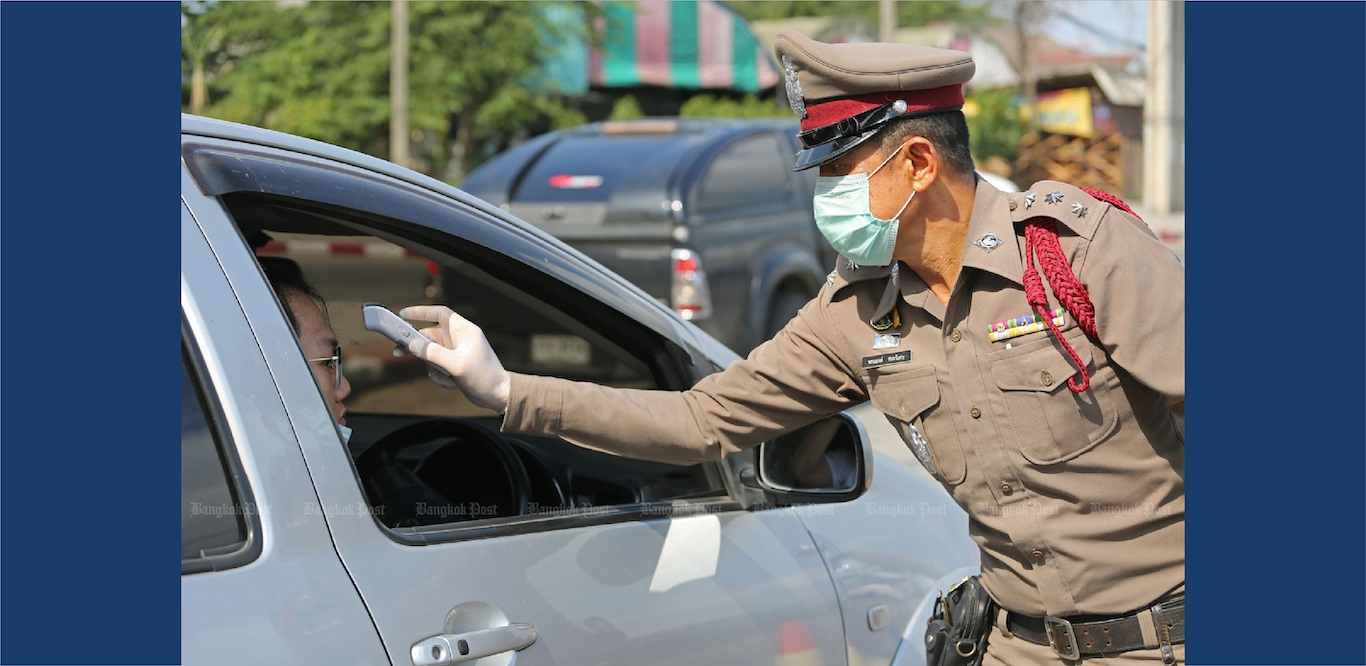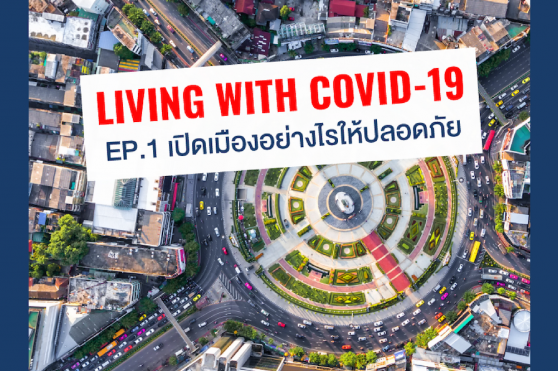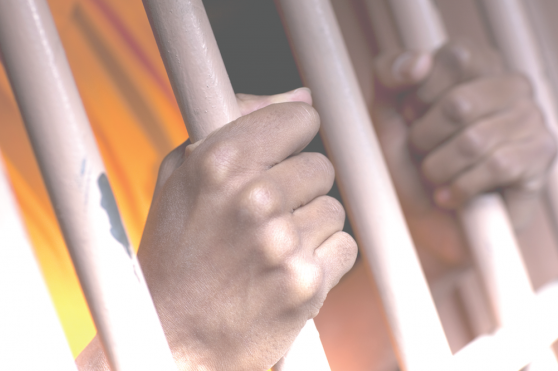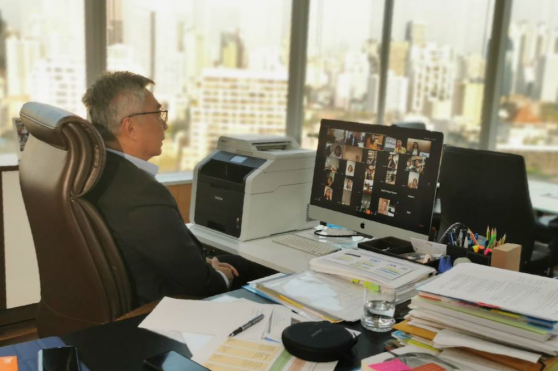The new normal guidelines for law enforcement officers during Covid-19 pandemic, quarantined police officers may threaten public safety
“We don’t really have a choice to arrest only perpetrators who do not have risk behavior of being infected with Covid-19 virus. Violators that do not comply with Emergency Decree, those involved in gambling or mass gathering are all considered having risk behaviors. Every incident reported will be responded by officers, it’s our duty. We are more concerned with public safety rather than the risk of being exposed to the virus.”
 This was a verbatim of Pol.Maj.Gen. Tatchai Pitaneelabutr, Deputy Commissioner of Provincial Police Region 2, who shared his view on “Police and evolving crime during Covid-19 pandemic” at Living with COVID-19, a virtual conference through Zoom application organized by Thailand Institute of Justice (TIJ) through Rules of Law Development network or RoLD.
This was a verbatim of Pol.Maj.Gen. Tatchai Pitaneelabutr, Deputy Commissioner of Provincial Police Region 2, who shared his view on “Police and evolving crime during Covid-19 pandemic” at Living with COVID-19, a virtual conference through Zoom application organized by Thailand Institute of Justice (TIJ) through Rules of Law Development network or RoLD.
The Deputy Commander of Provincial Police Region 2 elaborated further on how law enforcement officers operate during the outbreak. He pointed out that the protective measures imposed, particularly social distancing, facilitated the public service provided at police stations when citizens come in to file complaints or report incidents. However, police officers also have patrol duty to ensure public safety as well as investigative works or apprehension of perpetrators, which were all challenging to enforce during social distancing. The recent armed robbery incident at a bank in Bang Pakong, police officers had to charge and arrested him and could not avoid close contact with the armed suspect.
“Police work is teamwork. Raids and arrests operations are conducted as a team based on a principle that officers should outnumber the criminals. So if a team member contacts an infected person or becomes infected, other team members will have to be quarantined as well. In some circumstances, the whole police station could be under quarantine. Police accommodations are also organized in a form of large community of officers who all live together in a shared space. It is quite challenging to keep a distance from other officers and family members that live together.”
Statistics from the Royal Thai Police as of 28 April 2020, 60 officers were infected with Covid-19, 44 of which recovered, 16 of them are undergoing treatment. But the interesting figures showed that as many as 1,141 officers had undergone self-quarantine and to date, 243 officers remain in quarantine.
From the stated figures, police officers are considered at high risk of being infected, and many have been quarantined. Although general crime rates tend to have decreased due to lockdown and curfew measures, cybercrime rate has increased continuously. Moreover, other types of crime showed trends toward increase due to economic difficulties such as robberies of ATMs, gold shops or convenient stores. In Chantaburi province, there were even cases of Durian farm heists. And most of the perpetrators had no prior criminal records.
 With the current police work conditions, Assistant Professor Dr. Pareena Srivanit, Dean of Faculty of Law, Chulalongkorn University conducted a research on law enforcement officers and officers in the justice system during Covid-19 period and proposed “Guidelines for police during Covid-19,” which consists of 2 areas namely, “Officers Health Measures” and “Early Diagnosis and Quarantine Measures.”
With the current police work conditions, Assistant Professor Dr. Pareena Srivanit, Dean of Faculty of Law, Chulalongkorn University conducted a research on law enforcement officers and officers in the justice system during Covid-19 period and proposed “Guidelines for police during Covid-19,” which consists of 2 areas namely, “Officers Health Measures” and “Early Diagnosis and Quarantine Measures.”
“Officers Health Measures” is aimed at mitigating risks for police officers on duty, ranging from Personal Protective Equipment (PPE) preparation such as face masks, disinfecting hand gel, face shield, rubber gloves to full PPE suits. Agencies shall provide all necessary protective equipment and ensure protective equipment use training for all officers.
Asst. Prof. Dr. Pareena reiterated that the New Normal work format for officer can be proposed as new “Deployment” guidelines where teams of patrol officer or investigators shall work under rules that they do not come into close contact with one another. This way, if under any circumstances one team has to be in quarantine, there will be other teams available to work. And this also involves making reserved deployment teams available.
In tactical aspect in conducting arrests which require officers to be in close contact with the suspect or perpetrators, Asst. Prof. Dr Pareena recognizes the possibility of conducting training for officers on the use of PPE and Standard Operating Procedures (SOP) to avoid contamination from bodily fluids. Screening checkpoints SOP should be followed, such as not sticking their heads in the vehicle during an inspection, refraining from touching the vehicle or wearing PPE correctly at all times while performing their duties. The tactical aspect also includes integrative coordination plan with line agencies in testing, referral procedure and quarantine efforts.
“Early Diagnosis and Quarantine Measures” encompass active case finding amongst police officers and systematic quarantine guidelines for all police force and law enforcement officer in justice system. Any officers or officials suspected of being infected with Covid-19 shall immediately be screened and kept under observation for any symptoms. Then they can be sent to quarantine or referred for medical diagnosis at once.
If initial assessment resulted in the quarantine of officers, systematic quarantine procedures should be in place. Quarantine location for police officers shall be taken into careful consideration whether it is appropriate and safe for the officers. If police accommodation is deemed inappropriate, the agency shall acquire necessary resources and set up temporary quarantine location which pose the least impact on the family members, colleagues or the surrounding communities.
 AVM Dr. Krailert Thiannukul, Royal Thai Airforce expert and Ophthalmologist at Bhumibol Adulyadej Hospital agreed that police officers patrolling in the communities are more at risk with the infection and unlike medical frontliners. Police are unable to wear full protective equipment while performing their duties nor observe social distancing with the subjects. More importantly, medical history of the suspects are not informed before police execute their operations. And even if information is collected, there is a high chance of discrepancies because often they withhold information about their past locations. Therefore, care for police officers should begin at the phase before they are exposed to the risks. Officers should be knowledgeable on self-care and use of necessary protective equipment and also practice situational awareness by conducting preliminary research on the subject and location. Additional medical insurance for Covid-19 shall be provided on top of the public officials’ healthcare benefits from Police General Hospital or Royal armed forces hospitals.
AVM Dr. Krailert Thiannukul, Royal Thai Airforce expert and Ophthalmologist at Bhumibol Adulyadej Hospital agreed that police officers patrolling in the communities are more at risk with the infection and unlike medical frontliners. Police are unable to wear full protective equipment while performing their duties nor observe social distancing with the subjects. More importantly, medical history of the suspects are not informed before police execute their operations. And even if information is collected, there is a high chance of discrepancies because often they withhold information about their past locations. Therefore, care for police officers should begin at the phase before they are exposed to the risks. Officers should be knowledgeable on self-care and use of necessary protective equipment and also practice situational awareness by conducting preliminary research on the subject and location. Additional medical insurance for Covid-19 shall be provided on top of the public officials’ healthcare benefits from Police General Hospital or Royal armed forces hospitals.
 Ms. Chontit Chuenurah, Director, Office for the Bangkok Rules and Treatment of Offenders, TIJ, pointed out that street crimes around the world have significantly decreased during Covid-19 pandemic due to lockdown measures. Crimes like robbery, theft, rape, murder and illegal drug sales have shifted to the looting of closed stores during curfew hours instead.
Ms. Chontit Chuenurah, Director, Office for the Bangkok Rules and Treatment of Offenders, TIJ, pointed out that street crimes around the world have significantly decreased during Covid-19 pandemic due to lockdown measures. Crimes like robbery, theft, rape, murder and illegal drug sales have shifted to the looting of closed stores during curfew hours instead.
The data showed that general crime rates in the Philippines had decreased 55%, Chicago, the United States 10% decrease for general crimes and a 40% decrease in drug crime. Spain, a country with a high rate of infection, has a 50% decrease in crime rate. In developing countries such as Yemen or India, new forms of crime emerged, such as water theft for agricultural purpose. Cybercrime rates have also increased due to high penetration of internet users, fraud crimes and identity theft are crimes that have been identified.
“Domestic violence” is another type of crime that has significantly increased during this period where people are locked down in their homes. Women are assaulted in their own homes but are unable to seek help and have difficulties accessing assistance. Domestic violence has increased by 59% in Malaysia, 33% in Singapore and 30% in France. In South America, where cross border organized crimes are prevalent, conventional methods for contraband or human smuggling are becoming more challenging. Trends are showing that criminals are changing their modus operandi and even attempting to smuggle drugs using drones.
Prof. Dr. Kittipong Kittayarak, Executive Director, TIJ concluded that for “police” and law enforcement officer to perform their duties efficiently and safely, immediate action is required to provide them with proper PPE, with proper SOP and guidelines for them to be able to apply knowledge from the guidelines to practice. Also, officers’ and their family members’ welfare should be reconsidered during times like this where they are working in risk areas and returning home everyday.
TIJ Executive Director added that police might use community policing tactics to ensure that cases are screened before being reported to the police, so it minimizes police presence. The exploitation of technology for investigative purposes such as CCTV, online complaint reporting, or offender/suspect track and trace application can streamline SOP, therefore reducing the risk of infection. Enhanced preliminary screening can help classify types of cases that may need or may not need to be resolved at the police stations.
Finally, Professor Dr. Kittipong commended all police officers and law enforcement officials for their dedication and commitment to ensure public safety and that they are also “heroes” working at the frontline just like medical personnel and doctors.






